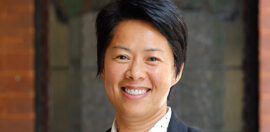Leading With Lived Experience
18 April 2016 at 10:30 am
Dean Barton-Smith AM has been profoundly deaf since birth and, after more than two decades in the Not for Profit sector, he has taken on the role of CEO of Deaf Children Australia. Barton-Smith is this week’s Changemaker.
 Barton-Smith believes his lived experience of deafness, and the challenges he faced in mainstream schools that lacked proper support, has held him in good stead to ensure that deaf and hard-of-hearing children have access to better services.
Barton-Smith believes his lived experience of deafness, and the challenges he faced in mainstream schools that lacked proper support, has held him in good stead to ensure that deaf and hard-of-hearing children have access to better services.
These early hardships inspired Barton-Smith to improve the lives of others. He has more than 10 years experience as CEO across different organisations, including the Victorian Mental Illness Awareness Council. He also campaigned for the establishment of the NDIS and has served as a member of its Independent Advisory Council.
As this week’s Changemaker, he explains why it’s important for people with lived experience to be at the helm of organisations.
How did you get your start in the Not for Profit sector?
As I was at a crossroads with my athletics career, I relocated from Adelaide to Melbourne in 1995 to work for a newly-established, innovative, national Not for Profit organisation [called the] Australian Communication Exchange. Australian Communication Exchange provides telecommunication access for people who are deaf, hard of hearing or have a speech impairment. The key service it provided is known as the National Relay Service.
I ended up spending 10 great years at this forward thinking organisation under the mentorship of the founding chief executive officer Len Bytheway. Without a doubt, this learning opportunity helped broaden my capabilities, giving me a greater appreciation of the Not for Profit sector and providing me with the foundation to further my professional career.
What do you hope to achieve in your new role with DCA? And why are services for deaf or hard of hearing children so important?
I am joining the team at Deaf Children Australia during a period of significant change. We will be implementing Deaf Children Australia’s new strategic plan and aiming to expand our services through the unfolding opportunities created by the rollout of the National Disability Insurance Scheme. We will need to identify those new opportunities, innovate and establish strong partnerships with like-minded organisations.
We need to ensure that we intimately understand the challenges that children, young people and adults – and their families – experience in different life phases. Many across Australia still experience a sense of stigma, discrimination and a lack of access, leaving them feeling isolated and less included. In other cases, families are being misinformed as to what their deaf or hard-of-hearing child is truly capable of, and what options are available out there. We need to further increase awareness and understanding of the issues affecting deaf and hard-of-hearing children and youth, and their families.
While education of deaf and hard-of-hearing children is a bit better since I was growing up, we have a lot of work to do in that space. When I went back to university, I realised how powerful it was to have that asset of a good accessible education – to feel included and have a sense of accomplishment. Every day, we can leave little footprints in changing society’s perceptions. We have come a long way and we certainly have more work to do going forwards… but with ongoing perseverance, we will get there. The same applies to creating more opportunities in employment, sport and recreation.
How has your lived experience of deafness inspired you to make a difference in the lives of others?
Having experienced stigma, inaccessibility and discrimination throughout my school years and across various aspects of my employment and social life, I have come to understand that many people tend to be misled. They often don’t realise what deaf children, youths and adults are truly capable of if others consider making slight adjustments or modifications to enable those individuals to fully engage and contribute.
Making it to the Olympic Games and two Commonwealth Games plus four Deaflympic Games, allowed me to constantly challenge myself and society’s perceptions. Having applied myself to achieve my Masters in marketing with Monash University much later in life was another tough personal challenge. I found that I do have an element of choice and control with regards to environmental settings and that with assertiveness and a bit of awareness and education, I could achieve things that 15 to 20 years ago I would not have thought possible.
I want to support children and youths to address the additional challenges they face and pursue their own dreams.
Why is it important for people with lived experiences to have leadership roles in organisations like DCA?
This is critically important nowadays and in the future. There are people with a lived experience that may possess anywhere from five to 30 years experience in their chosen careers that should not be undervalued.
Anyone with a lived experience is an expert in their own right and such intimate insights help forge closer relationships with the stakeholders we are dealing with in our particular sectors. In many ways, that experience enables smart decisions to be made in so far as prioritising resources where the needs are greatest, as well as good governance and risk management strategies. Encouraging diversity in your workplace should encapsulate much more than just addressing the gender balance.
Fostering a top-down approach in incorporating capable skilled people with lived experience at all levels of leadership is a very smart way to go. It is also a positive reflection of the organisation’s commitment to its values and principles and what they stand for.
Customers/consumers will have a greater appreciation as to the sense of the organisation’s integrity and authenticity when this is applied.
I’m a firm believer that if you invest in people who possess a lived experience, at various levels in the organisation, the return of investment is three-fold. In addition, smart, high-performing boards who consider having directors with lived experience can bring an additional layer of knowledge and added value at governance level.
Apart from your leading roles within the Not for Profit sector you’ve also represented Australia as an athlete, what do you put your personal success down to?
Dedication, commitment, focus and keeping the end in mind. I would advise others to surround themselves with really good, committed people who share common values and principles. Be really prepared to listen and learn. I always believe spending an hour with a wise person is equivalent to a shelf of books. I probably had more knockers than believers over my life journey as I was constantly faced with the stigma of having a “disability” and knowing that, at times, I may have to create new paths in the process of reaching my goals.
You’ve been involved in the campaign for the NDIS, are you happy with how the rollout is shaping up?
I’m constantly reminding myself that, in using the Olympic/athletics analogy, the rollout of the NDIS is a marathon not a sprint event. The NDIS is a significant piece of social reform and I know those who work within, including those governing this scheme, are very committed to shifting away from the old welfare model. In doing so, they are breaking new ground everyday.
I constantly hear stories of how the NDIS is making a positive impact and creating a radical shift towards a consumer-centric model. It is a massive change management process for everyone but one that needs to happen. It is not without its challenges. There are many old, restrictive tired systems that are not geared towards a consumer-centric approach. They don’t provide enough choice and control and they may lack quality and safeguards so it will take time to revert these systems to a more modern approach. It is a massive undertaking. Hence, a progressive approach is required in order to be able to address a myriad of issues and develop a new way of thinking and new opportunities.
Does anything about the sector make you frustrated?
If an organisation is providing services or advocacy for a particular market segment, that market segment will progressively test the organisation’s authenticity of being able to be true to itself. Our markets are becoming increasingly knowledgeable and savvy. Nothing is more frustrating for me than to see organisations not walking the talk as to their values and principles, and not putting the customer at the centre of everything they do. For example, they need to make sure that accessibility is at the forefront of their planning process – not at the end.
What keeps you motivated?
The future is what you make of it. If not you, then who? I really enjoy being challenged and I look at ways to achieve the outcomes that I know will not only benefit myself but also others. We are all on this planet once and we should all make an effort, however small it may be, to make the planet a much better one for our current and future generations.
Throughout my life journey, I only had a small handful of people who took the time to believe in me and impart their knowledge and wisdom to me. This has proven to be most valuable and I’m always committed to paying it forward as I know how hard, lonely and frustrating it can be. I really enjoy seeing people, regardless of whether they have a disability or not, work through their challenges and achieve their own personal goals. If I can contribute in some way to help them, then all the merrier.







